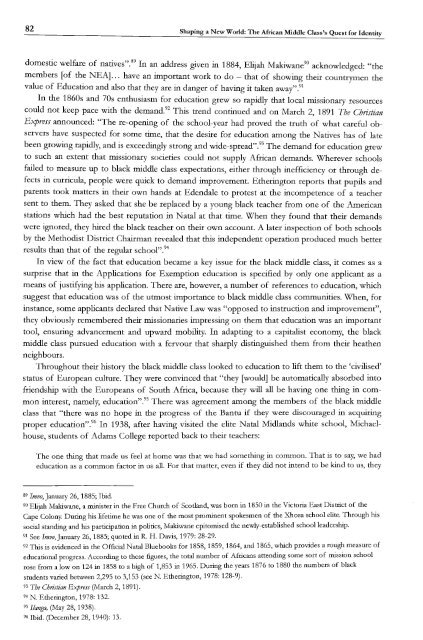South African Choral Music (Amakwaya): Song, Contest and the ...
South African Choral Music (Amakwaya): Song, Contest and the ...
South African Choral Music (Amakwaya): Song, Contest and the ...
Create successful ePaper yourself
Turn your PDF publications into a flip-book with our unique Google optimized e-Paper software.
82 Shaping a New World: The Mrican Middle Class's Quest for Identity<br />
domestic welfare of natives".89 In an address given in 1884, Elijah Makiwane 90 acknowledged: "<strong>the</strong><br />
members [of <strong>the</strong> NEA]... have an important work to do - that of showing <strong>the</strong>ir countrymen <strong>the</strong><br />
value of Education <strong>and</strong> also that <strong>the</strong>y are in danger of having it taken away".91<br />
In <strong>the</strong> 1860s <strong>and</strong> 70s enthusiasm for education grew so rapidly that local missionary resources<br />
could not keep pace with <strong>the</strong> dem<strong>and</strong>. 92 This trend continued <strong>and</strong> on March 2, 1891 The Christian<br />
Express announced: "The re-opening of <strong>the</strong> school-year had proved <strong>the</strong> truth of what careful observers<br />
have suspected for some time, that <strong>the</strong> desire for education among <strong>the</strong> Natives has of late<br />
been growing rapidly, <strong>and</strong> is exceedingly strong <strong>and</strong> wide-spread".93 The dem<strong>and</strong> for education grew<br />
to such an extent that missionary societies could not supply <strong>African</strong> dem<strong>and</strong>s. Wherever schools<br />
failed to measure up to black middle class expectations, ei<strong>the</strong>r through inefficiency or through defects<br />
in curricula, people were quick to dem<strong>and</strong> improvement. E<strong>the</strong>rington reports that pupils <strong>and</strong><br />
parents took matters in <strong>the</strong>ir own h<strong>and</strong>s at Edendale to protest at <strong>the</strong> incompetence of a teacher<br />
sent to <strong>the</strong>m. They asked that she be replaced by a young black teacher from one of <strong>the</strong> American<br />
stations which had <strong>the</strong> best reputation in Natal at that time. When <strong>the</strong>y found that <strong>the</strong>ir dem<strong>and</strong>s<br />
were ignored, <strong>the</strong>y hired <strong>the</strong> black teacher on <strong>the</strong>ir own account. A later inspection of both schools<br />
by <strong>the</strong> Methodist District Chairman revealed that this independent operation produced much better<br />
results than that of <strong>the</strong> regular school".94<br />
In view of <strong>the</strong> fact that education became a key issue for <strong>the</strong> black middle class, it comes as a<br />
surprise that in <strong>the</strong> Applications for Exemption education is specified by only one applicant as a<br />
means of justifying his application. There are, however, a number of references to education, which<br />
suggest that education was of <strong>the</strong> utmost importance to black middle class communities. When, for<br />
instance, some applicants declared that Native Law was "opposed to instruction <strong>and</strong> improvement",<br />
<strong>the</strong>y obviously remembered <strong>the</strong>ir missionaries impressing on <strong>the</strong>m that education was an important<br />
tool, ensuring advancement <strong>and</strong> upward mobility. In adapting to a capitalist economy, <strong>the</strong> black<br />
middle class pursued education with a fervour that sharply distinguished <strong>the</strong>m from <strong>the</strong>ir hea<strong>the</strong>n<br />
neighbours.<br />
Throughout <strong>the</strong>ir history <strong>the</strong> black middle class looked to education to lift <strong>the</strong>m to <strong>the</strong> 'civilised'<br />
status of European culture. They were convinced that "<strong>the</strong>y [would] be automatically absorbed into<br />
friendship with <strong>the</strong> Europeans of <strong>South</strong> Africa, because <strong>the</strong>y will all be having one thing in common<br />
interest, namely, education".95 There was agreement among <strong>the</strong> members of <strong>the</strong> black middle<br />
class that "<strong>the</strong>re was no hope in <strong>the</strong> progress of <strong>the</strong> Bantu if <strong>the</strong>y were discouraged in acquiring<br />
proper education".96 In 1938, after having visited <strong>the</strong> elite Natal Midl<strong>and</strong>s white school, Michael<br />
house, students of Adams College reported back to <strong>the</strong>ir teachers:<br />
The one thing that made us feel at home was that we had something in common. That is to say, we had<br />
education as a common factor in us all. For that matter, even if <strong>the</strong>y did not intend to be kind to us, <strong>the</strong>y<br />
89 Imvo, January 26,1885; Ibid.<br />
90 Elijah Makiwane, a minister in <strong>the</strong> Free Church of Scod<strong>and</strong>, was born in 1850 in <strong>the</strong> Victoria East District of <strong>the</strong><br />
Cape Colony. During his lifetime he was one of <strong>the</strong> most prominent spokesmen of <strong>the</strong> Xhosa school elite. Through his<br />
social st<strong>and</strong>ing <strong>and</strong> his participation in politics, Makiwane epitomised <strong>the</strong> newly-established school leadership.<br />
91 See Imvo,January 26,1885; quoted in R. H. Davis, 1979: 28-29.<br />
92 This is evidenced in <strong>the</strong> Official Natal Bluebooks for 1858, 1859, 1864, <strong>and</strong> 1865, which provides a rough measure of<br />
educational progress. According to <strong>the</strong>se figures, <strong>the</strong> total number of <strong>African</strong>s attending some sort of mission school<br />
rose from a low on 124 in 1858 to a high of 1,853 in 1965. During <strong>the</strong> years 1876 to 1880 <strong>the</strong> numbers of black<br />
students varied between 2,295 to 3,153 (see N. E<strong>the</strong>rington, 1978: 128-9).<br />
93 The Christian Express (March 2,1891).<br />
94 N. E<strong>the</strong>rington, 1978: 132.<br />
95 Ilanga, (May 28, 1938).<br />
96 Ibid. (December 28,1940): 13.

















